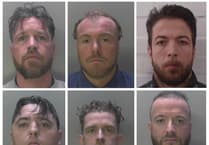THE Russian invasion of Ukraine could have been stopped if the West had taken stronger action against President Putin years ago, says a former diplomat and counter-terrorism expert who has lived in the local area for more than 45 years.
Anthony Paice was speaking to the News & Mail on the release of his book Overkill Or Under-kill about his first-hand experience of the 1990 Iraqi invasion of Kuwait where he was working in the British Embassy.
He will be signing copies of the book, which is being published by The Book Guild, at Waterstones in Woking tonight at 6.15pm.
“For Putin read Saddam; they’re very similar in their approach to life,” Anthony said.
“Dictators will always go as far as you let them and he’s done just that.”
Anthony, who was the political officer in the embassy from 1988, said the US Ambassador to Baghdad was ambivalent in telling Saddam what he should or should not do.
“That was the green light for Saddam,” Anthony said.
“He decided that the Americans aren’t going to do anything; he could walk in and things would fall apart.
“This is not so different from what Putin has done in Ukraine. He thought NATO would fall apart and everybody would accept the Russian occupation of Ukraine.”
Anthony said Putin was emboldened in his territorial ambitions when the UK and the US decided not to declare a “no-fly zone” over Syria about 10 years ago.
“We could have easily done it from Cyprus,” Anthony said.
“Instead, we left a vacuum and in comes Putin with his jets which destroyed Aleppo.
“We could have stopped all that and put Putin back in his place.”
Anthony, who lived in Pyrford from 1977 until he moved to Ottershaw in 2001, has a history degree from King’s College, London, specialising in war studies and was sent by the Foreign and Commonwealth Office (FCO) to posts in Calcutta, Bonn, Vienna and Kuwait.
“
This is not so different from what Putin has done in Ukraine. He thought NATO would fall apart and everybody would accept the Russian occupation of Ukraine.”
Anthony Paice
He is cagey about his precise roles, although he says he often speaks to Gordon Corera, the BBC security correspondent.
In a report that mentions Anthony’s book, Overkill Or Under-kill, Corera wrote that “he had what he calls ‘responsibility for political intelligence [in Kuwait]’, although he has previously been named as an MI6 officer working undercover at the British Embassy.”
Anthony told the News & Mail: “If you read between the lines you’ll see exactly what I did. I was on foreign service.
“My original employers do not like their staff to self avow so I’m not doing that.”
Anthony said he wrote Overkill Or Under-kill to give his version of the lead-up to the invasion of Kuwait and to counter false accusations in various media that he, and other senior diplomats in the embassy, failed to warn of Saddam’s intentions.
“I have two motivations. One is to make sure history is correct.
“The other is to do something for the people who did suffer from the whole saga and it includes the British Airways passengers.”
He was referring to the passengers and crew of BA149 who were held for five months as “human shields” at strategic Iraqi sites after the plane landed on the morning of the invasion.
Anthony said he warned BA in advance of the dangers and believes this was ignored because it secretly included British special forces troops.
The Government has denied this but in his book Operation Trojan Horse, Stephen Davis says he has interviewed members of the team anonymously and people who planned the mission.
“Stephen and I are now very good friends,” Anthony said. “We’ve collaborated and he’s written the forward to my book.
“If the BA149 survivors were to take this to court to seek compensation, I would be subpoenaed as a witness and I would be very happy to stand up in court.
“My book is dedicated: ‘To all those who suffered from Saddam’s cruelty, particularly the Kuwaiti hostages who were abandoned by the world and others who received no compensation for their suffering’,” Anthony said.





Comments
This article has no comments yet. Be the first to leave a comment.